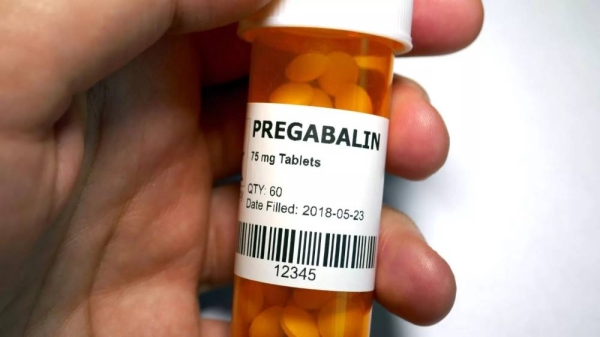LONDON — The anti-anxiety drug has been linked to fatalities in the UK, leading people taking the drug to come forward about their debilitating side effects.
The first time Jade had a panic attack, she called an ambulance. Terrified and feeling as though her world had suddenly tilted, she’d recently stopped taking pregabalin, a drug prescribed to her for anxiety.
Two years later, she is still trying to wean herself off it.
“If I miss a dose I have trouble breathing, depersonalization, panic attacks, extreme body restlessness, feeling as though I am going to pass out,” the 29-year-old told Euronews Health.
“I don’t think doctors realise the severity of it.”
The drug has been prescribed to more than 8 million people in the UK, according to a study.
Over the last five years in Britain, there were nearly 3,400 pregabalin-related fatalities, with 779 of those in 2022 alone, up from 9 deaths a decade earlier, according to an investigation by The Sunday Times.
These figures have put a spotlight on the potential dangers of the widely-prescribed drug and highlighted long-held concerns about drug dependency.
Also known by the brand names Alzain, Axalid, and Lyrica, pregabalin is an anticonvulsant that was initially prescribed to treat epilepsy but is now commonly used for anxiety and nerve pain.
While its mechanisms are still not fully understood, pregabalin is thought to work by reducing abnormal electrical activity in the brains of epileptics, and subduing anxiety-inducing chemicals and nerve pain by blocking specific neurotransmitters, according to the UK’s National Health Service (NHS).
Common doses of pregabalin range from 150mg to 600mg, usually split into 2-3 pills per day, although it can also be taken as a liquid.
In 2019, it was made a class C drug under the Misuse of Drugs Act 1971, making it illegal to possess without a written prescription. Those controls were due to “rising fatalities,” the UK government said.
Listed side effects include headaches, feeling sleepy, diarrhoea, mood changes, feeling sick, swollen limbs, blurred vision, difficulties getting an erection, memory problems, and weight gain.
The NHS notes that these are usually “mild and go away by themselves,” but many prescribed the drug claim to have negative experiences.
While beneficial in treating certain conditions, some people become addicted to the “euphoric” or relaxed state that pregabalin can induce, building tolerance quickly before needing higher doses to achieve the same sensation.
For others, the side effects have been debilitating but the withdrawals are worse, leading to a dependency that impedes quality of life.
Sarah*, a 44-year-old social worker living in London, was prescribed pregabalin for fibromyalgia, a condition characterised by chronic pain, and also suffered from extreme withdrawal symptoms after deciding to taper off the drug when it stopped being effective for pain.
“I ended up suffering depression, anxiety, suicidal tendencies, severe icy chills, extremely loud tinnitus, funny turns, and seizures, none I had before that drug. I have been completely off [pregabalin] for nearly four years and am still struggling with long term withdrawals,” she said.
Caroline, a UK-based carer who was put on pregabalin for nerve pain, reported weight gain, terrible brain fog, memory issues, and even loose, broken teeth as side effects.
“I am absolutely terrified about coming off this drug,” the 55-year-old said.
Those suffering have taken to online support spaces, including the private Facebook group “Lyrica Survivors (Pregabalin and Gabapentin Support)”, which has over 15,000 members.
“People’s lives have been devastated by this drug, including loss of life, loss of employment, legal action due to altered mental status from the drug, children removed from the home, families separating, financial hardship, and of course, permanent disability in many cases,” said Amy Ireland, the Facebook group’s admin.
Most members are looking for guidance on how to stop taking the medicine, with the group’s main aim to raise awareness of the dependency-inducing effects of this type of drug known as a gabapentinoid.
“A lot of people think withdrawal effects means you’re addicted to the drug, and that implies some kind of misuse. That’s not the case,” said Dr Mark Horowitz, a psychiatrist specialising in helping people to stop psychiatric drugs.
“Physical dependance is a predictable response of the body and brain to repeated exposure to psychoactive drugs like pregabalin,” he added.
As prescriptions of the drug have increased, there remains a lack of services to support those that feel trapped by it, some say.
“The three basic principles on how to safely stop gabapentinoids like pregabalin are, firstly, to do it slowly. It can take people months or even years to get off drugs they’ve been on for many years,” said Horowitz, who runs a clinic in London to help people stop taking psychiatric drugs and published a clinical handbook called the ‘Maudsley Prescribing Guidelines’ last month.
“The second principle is, everybody’s a bit different. There are probably risk factors, like the longer you’ve been on the drugs or the higher the dose, the harder it is to stop,” he said.
He points out however that there hasn’t been much research on what potential individual risk factors there are, with trial and error involved with each patient.
The third and final principle for stopping pregabalin is known as hyperbolic tapering, which means gradually reducing the amount someone is taking.
“As you get to lower doses, you need to go slower and slower, like climbing down a vertical cliff,” he said.
Horowitz believes that medical professionals need to reevaluate the short-term ways in which they are treating mental health conditions such as anxiety.
“Pregabalin is a dangerous drug. It’s one of the quickest rising causes of accidental overdoses; it affects the way that we think, it affects memory and cognition. It affects sleep, causes weight trouble. There’s a whole host of negative effects for long term use. And it’s hard to stop.
“We have been locked into this cycle of trying to find the chemical magic bullet to solve anxiety, And I don’t think there’s a drug that has long-term effects on anxiety that doesn’t have all these costs,” he added.
Some experts have said that most reported pregabalin-related deaths occur when it’s taken in combination with opiates.
“Pregabalin could be effective and helpful for many people, but patients should follow the advice of their doctor and report any side effects they experience,” Glyn Lewis, a professor of psychiatric epidemiology at University College London said in a statement.
Lewis is part of a team carrying out an NHS-funded study to investigate pregabalin’s effectiveness for treating anxiety in those who haven’t responded to antidepressants. It will also investigate whether there are withdrawal symptoms when the medication is stopped.
First approved in 2004 and sold by drug manufacturer Pfizer, prescriptions of pregabalin have increased across Europe, according to research published in 2021.
The study noted that in Sweden, for instance, pregabalin was found in 28 percent of fatal intoxications among drug addicts. — Euronews



